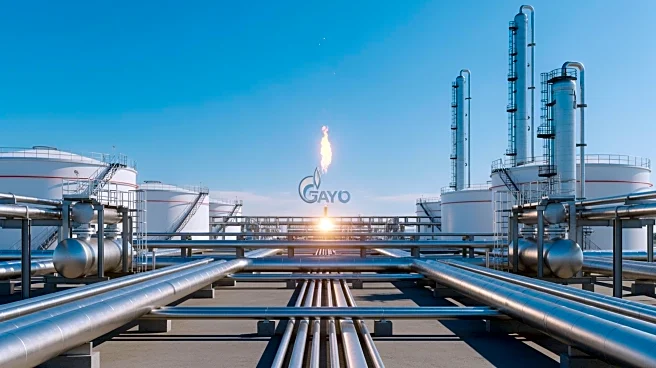What's Happening?
LNG Canada has initiated production at its second processing unit, Train 2, located in Kitimat, British Columbia. This development marks the full operational status of both units at the Shell-led project,
each with a capacity of 6.5 million metric tons per annum. The facility, which took nearly seven years to construct, is the first major LNG export facility in Canada and the first on the west coast of North America, providing direct access to Asia, the largest market for liquefied natural gas. Despite technical challenges that have slowed the ramp-up, the facility is now processing approximately two billion cubic feet of gas per day. The startup of Train 2 is anticipated to create sufficient demand to alleviate the surplus of natural gas in Western Canada, potentially boosting prices.
Why It's Important?
The commencement of production at Train 2 is significant for the natural gas market, particularly in Western Canada, where a glut has been affecting prices. By increasing demand through exports to Asia, LNG Canada could help stabilize and potentially increase natural gas prices. This development is also crucial for the Canadian energy sector, as it enhances the country's position in the global LNG market, providing a strategic export route to Asia. The involvement of major international stakeholders, including Shell, Petronas, PetroChina, Mitsubishi Corp, and KOGAS, underscores the project's global importance and potential economic impact.
What's Next?
With the operational status of both trains, LNG Canada is expected to continue ramping up production and exports. Market participants are closely monitoring the impact on natural gas prices and storage levels in Western Canada. Additionally, the recent announcement by MidOcean to acquire a portion of the Petronas venture indicates potential shifts in stakeholder dynamics and investment strategies within the project. The ongoing export activities and strategic partnerships may lead to further developments in the global LNG market, influencing trade patterns and energy policies.
Beyond the Headlines
The startup of Train 2 at LNG Canada not only impacts the natural gas market but also highlights the growing importance of LNG as a cleaner energy source in the global transition towards sustainable energy solutions. The project's success could encourage further investments in LNG infrastructure, promoting economic growth and energy security. Additionally, the collaboration among international companies reflects the interconnected nature of the energy sector, where geopolitical and economic factors play a significant role in shaping market dynamics.









